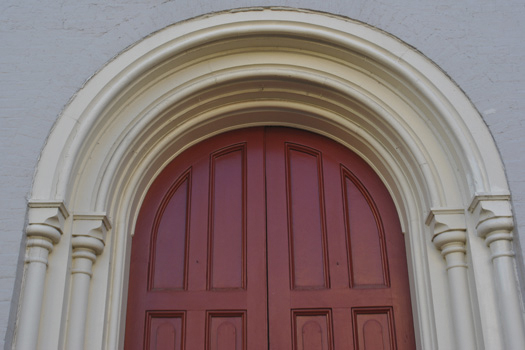I talked with Martha on May 18, 2015 about two months before her death. She was spry, alert and of course very opinionated! She said she served 40 years on the Altar Guild which is certainly a record for longevity.
She stressed that she always followed the orders of the priests. She said the job changed over her years becoming more involved. She wanted to recognize Avis Harris of whom she said was an angel, always working around the work of the altar guild. She said that in her service she gave a cross and the ambry.
At her funeral, Rev. Joseph Hensley emphasized the Altar Guild as “a family unto themselves. Martha trained most of our current altar guild members on a proper way to do things, from polishing the silver communion cups and plates to ironing and folding the linens. I was talking with one member of the guild about the instruction she received from Martha.”
“On page 63, it says to “iron with care using a steam setting. Some churches prefer that the folds in the lavabo towel, purificators, and corporal” (which are some of the different cloths we use in communion) “not be ironed in, but hand folded.” Apparently, this was Martha’s way also. Folds were NOT to be starched or ironed in but finger creased. She would gently correct those who did otherwise. On the surface this may seem like mundane detail, but there is a deeper meaning. From a practical standpoint, one does not iron in the folds because over time it weakens the fabric and requires replacement of the cloths which are hand embroidered. Martha was frugal and took care of things accordingly. Not ironing the folds means that linens last longer. Linens that are starched are stiff and difficult to work with. Then there may be a spiritual standpoint as well. I imagine that we are like the linens and God is a member of the altar guild. In the course of our lives we are folded and refolded. God’s grace both removes the wrinkles of our sin with its gentle heat but also creases our souls in ways that change us for the good. But God’s grace is not starchy or stiff. God’s grace does not press us down so that the structure of our fabric is compromised. God’s hand presses us gently, folding with a firm and caring touch. I don’t know if Martha Embrey ever gave any spiritual significance to the way she folded linens, but it seems to me that her way was like the way of God: gently forceful, loving but in a way that did not press too hard.”
Hensley said her hospitality and dignity was well suited the altar guild. “I have heard repeatedly about Hum-Hum’s skills as a hostess and cook, her ability to grow and arrange flowers, her feisty and fun personality. I have heard that she liked things done in a dignified way but was gently dignified in the way she did them or asked others to do them. She did not necessarily like change, but she approached the inevitable changes of life with gracefulness. In all these things she was a giving person, devoted to family and friends, gardens and growing things.” At the funeral her grandson Tom Bass said that “people were drawn to her” and “dignified on her own terms.” She remained positive in life which was probably helped because she was in the care of others.
The obituary stated this “Born Nov. 8, 1921, in Lynchburg, she was the daughter of John Fowler Wingfield and Ruth Bocock Wingfield. After her father’s death in 1928, she lived with and was raised by her uncle and beloved aunt, John and Frances Oglesby. She arrived in Fredericksburg as a freshman at Mary Washington College, where she met and married A. T. “Tom” Embrey Jr., who was her husband of 54 years, predeceasing her in 1996.” Martha’s son Tom served on the Vestry from 1992-1994 and treasurer 1993-1994.
From the obitituary, “Outside of St. George’s she was a leader in numerous organizations and clubs, among them serving as a member of the Mary Washington Hospital Board. She shared her considerable talents and love of beauty as a member of the Rappahannock Valley Garden Club, twice serving as its president, and as an officer of The Garden Club of Virginia”
